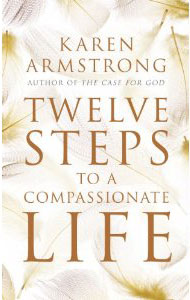Twelve Steps to a Compassionate Life by Karen Armstrong (Bodley Head)
 What could be more churlish than to say harsh things about a book that instructs us how to be more compassionate? I had thought I was going to be able to confound my own expectations, if no one else’s, by saying that Karen Armstrong’s self-help guide to compassion was a benign and well-meaning advice book, even though not to my taste – but when I got to the Seventh Step, “How Little We Know”, I had to give it up. The book’s title could as well be Twelve Steps to Cherry-picking. Armstrong’s case depends heavily on radical selectiveness in quoting from the “faith traditions” she credits for the concept and practice of compassion.
What could be more churlish than to say harsh things about a book that instructs us how to be more compassionate? I had thought I was going to be able to confound my own expectations, if no one else’s, by saying that Karen Armstrong’s self-help guide to compassion was a benign and well-meaning advice book, even though not to my taste – but when I got to the Seventh Step, “How Little We Know”, I had to give it up. The book’s title could as well be Twelve Steps to Cherry-picking. Armstrong’s case depends heavily on radical selectiveness in quoting from the “faith traditions” she credits for the concept and practice of compassion.
Ironically, she admits this herself in the first two pages, but without noticing that she’s done so, and without dealing with the problem in the rest of the book. On the first page she says that “all faiths insist that compassion is the test of true spirituality”, but then on the second she admits that Catholic “popes and bishops have ignored the suffering of countless women and children” and that some religious leaders “rarely speak of compassion” but instead fume over female ordination. Well, quite – so in what sense is it true that all faiths insist that compassion is the test of true spirituality?
Armstrong never actually answers that question; she never even bothers to pin down exactly what she means by the claim. Instead she illustrates it, with stories; it becomes clear that what she actually means is that all religions include figures who emphasise compassion, which is a much more limited suggestion. She offers anecdotal evidence for the reasonable claim that compassion is one thread in all religions, but not for the much stronger claim she actually makes here and in her Charter for Compassion.
The categorical assertion of the Charter for Compassion is very strong: “The principle of compassion lies at the heart of all religious, ethical, and spiritual traditions.” The problem with that should be obvious: it is not true. The principle of obedience to God lies at the heart of many religious traditions, and it is a modern illusion to think that is identical to compassion.
The best, and longest, chapter is “The First Step”, attractive stories about “sages” of compassion from Buddhism and Confucianism to Judaism, early Christianity and Islam. The stories are selected to make a point, but they are pleasant enough to read. Much of the book, however, seems recycled from The Case for God, especially in its fervent embrace of a kind of principled vagueness about “God” and knowledge. The seventh step/chapter, “How Little We Know”, treats scepticism not as an epistemic or methodological approach but as a fuzzy form of religion. She offers an admiring description of the Chinese “mystic and sage” Zhuangzi as claiming that “the only thing worth saying was a question that plunged listeners into doubt and numinous uncertainty”. Maybe he did, but she represents Socrates as also valorising a permanent dreamy unknowing, which is not even close to right. She attributes the same kind of slack-jawed wonder, absurdly, to Karl Popper. She writes that he “often remarked: ‘We don’t know anything’ and believed that this was the most important philosophical truth there is. But far from being depressed by his lack of knowledge, he revelled in it.” Armstrong seems to have Popper confused with Julian of Norwich. “Today,” she writes, “unknowing no longer seems obscurantist.” I beg to differ.
I would bear all this with a better grace if she were at least a lively writer but, to be brutally frank, her style sets my teeth on edge. Certain favoured sentimental words recur with maddening regularity, and feel like bossy little tugs on the sleeve – “see things this way”: “spiritual”, “deep”, “profound”, “mystery”, “transcendent” – one begins to loathe the sight of them. This is inseparable from her rigorous avoidance of humour, wit or irony, her immovable earnestness, her sincerity. I agree with her that compassion is an important value, but it is not incompatible with lightness of touch.

